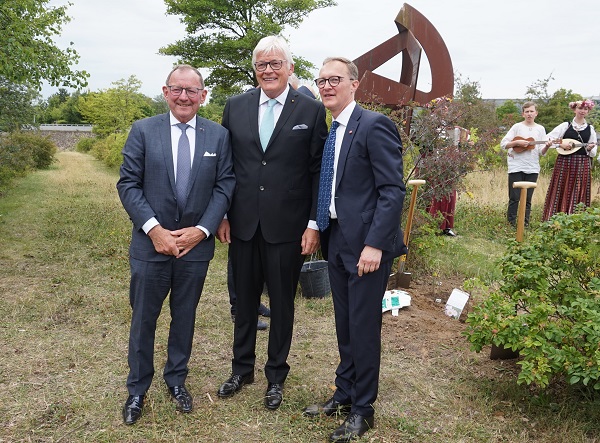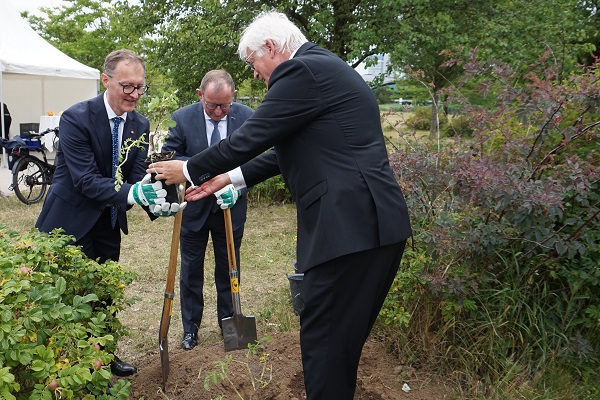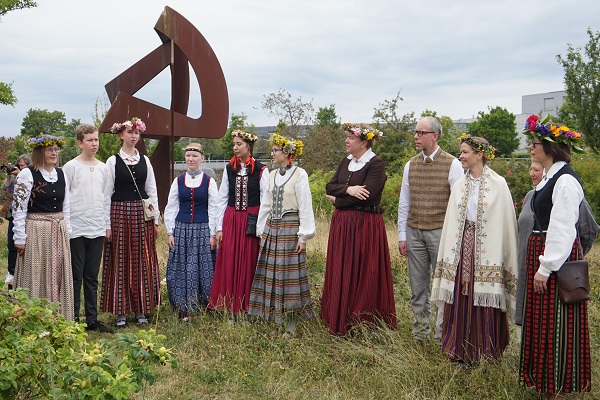 L-R: Fernand Etgen, President of the Chamber of Deputies; Honorary Consul Dr Henri Diederich; Latvian Ambassador Andris Razans;
Credit: Jazmin Campbell
L-R: Fernand Etgen, President of the Chamber of Deputies; Honorary Consul Dr Henri Diederich; Latvian Ambassador Andris Razans;
Credit: Jazmin Campbell
On Wednesday afternoon, the Consulate of Latvia in Luxembourg and the Latvia Embassy in Brussels, which is also accredited to Luxembourg, held a ceremony in Kirchberg Central Park to celebrate the 100th anniversary of bilateral relations between Latvia and Luxembourg and the 30th anniversary of re-established diplomatic relations between the two countries.
About 50 members of the Latvian and Luxembourgish communities attended this event, which was notably the occasion to plant roses gifted by Latvia to Luxembourg.
Honorary Consul of Latvia to Luxembourg, Dr Henri Diederich, began by highlighting the historic nature of this event. 100 years ago, Luxembourg recognised the Republic of Latvia as an independent republic. Three years later, on 15 June 1925, Grand Duchess Charlotte granted the exequatur to Jan Lasdin, Consul General of Latvia in Brussels, allowing him to exercise the same function in the Grand Duchy. One year later, the Grand Duchess granted the exequatur to Jean-Pierre Zanen to exercise the function of Consul of the Republic of Latvia in Luxembourg.
Actual diplomatic relations were fully restored on 21 April 1992 and resumed "normally" following Latvia’s declaration of independence. In early May 2022, Luxembourg’s Minister of Defence, François Bausch paid a two-day visit to Latvia to celebrate the 30th anniversary of the reestablishment of these diplomatic relations.
The Ambassador of Latvia to Luxembourg, Andris Razans, expressed his joy at being able to attend this event, noting that the COVID-19 pandemic had prevented him and the Embassy staff from coming to Luxembourg as often as they would have liked over the past three years. He highlighted three good reasons for attending this event: it was an occasion to congratulate his Luxembourgish colleagues and friends ahead of Luxembourg’s National Day; it took place just ahead of Latvia’s Midsummer Day celebrations (Līgo Day and Jāņi Day on 23 and 24 June, respectively); and this centenary year marked an important milestone in Latvia-Luxembourg relations. The Latvian Ambassador recognised that the past 100 years had "not been an easy ride", taking into account both countries’ histories during and after the Second World War. However, he later described Luxembourg as a "small bright candle of hope" for the people of Latvia for having never recognised the latter’s occupation.
Referring to Luxembourg’s historic reputation as the "land of roses", Ambassador Razans explained that he had not come emptyhanded to this event, but rather brought with him Latvian roses as a fitting gift for a friend such as Luxembourg. He noted that Europe could be divided along many lines, such as beer producers and wine producers, with Latvia falling into the former category and Luxembourg the latter, although these differences unite rather than separate us. Indeed, the ceremony ended with a reception that included both Latvian beer and Luxembourgish wine…
The event continued with the planting of the roses by Ambassador Razans, Chamber President Etgen and Honorary Consul Dr Diederich. Next to them is a plaque, with text in Latvian and in French, explaining how these roses commemorate both the centenary of bilateral relations established in 1922 and the 30th anniversary of the reestablishment of diplomatic relations in 1992.
Fellow special guest, Fernand Etgen, President of the Chamber of Deputies (Luxembourg’s parliament), described the date of this event as symbolic, as it fell on the eve of Luxembourg’s National Day. He highlighted the "excellent diplomatic relations" which have existed between the two countries for 100 years, adding that these bonds have grown even stronger in recent years. He also referred to the symbolism of the gifted roses, which he felt demonstrated these bonds of solidarity and friendship.
Also present were Danielle Fonck, member of the board of directors of Patrimoine Roses pour le Luxembourg asbl, and Thierry Helminger, biologist at the National Museum of Natural History (naturmusée). Both the non-profit organisation and the museum were involved in the process of acquiring these Latvian roses. Ms Fonck also returned the favour by presenting Ambassador Razans with recently baptised Luxembourgish roses.
On the sidelines of the ceremony, Honorary Consul Dr Henri Diederich explained to Chronicle.lu that whilst Europe is currently "going through rather sad times", he was "glad to say that the Republic of Latvia’s foreign policy has been one of the most successful stories of the post-Cold War era". He referred to the country’s accession to both the European Union (EU) and NATO in 2004. Concerning Latvia-Luxembourg relations, he noted: "Special ties have always existed between our two countries: since the beginning of the Soviet occupation in Latvia, Luxembourg viewed the Soviet rule as illegitimate and this throughout the 50 years of occupation of the country".
He also noted that the area where the roses were planted on this occasion had been filled with rose fields meant for royal households around the world 120 years ago.
There were performances by the Luxembourg-based Latvian choir "Meluzina" and the folk group "Dzērves", whose musicians were dressed in traditional Latvian clothing. The musicians sang the national anthems of both countries and later sang two more songs in Latvian.










